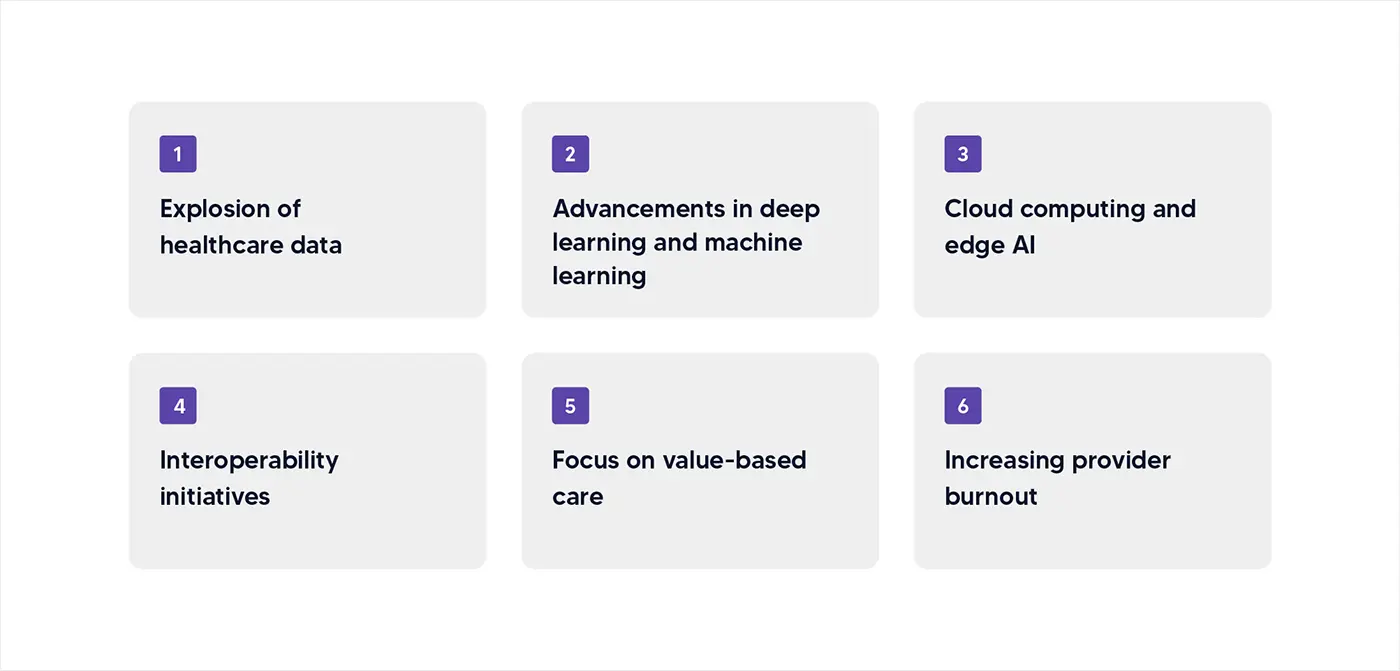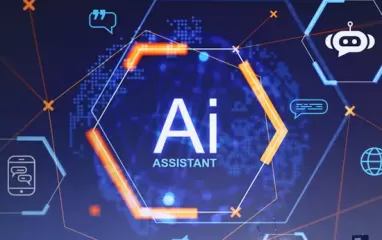Other recent blogs


Let's talk
Reach out, we'd love to hear from you!
The healthcare landscape is on the verge of revolutionary transformation, driven by the increasing sophistication of artificial intelligence. While AI has already made significant inroads, a particularly exciting and impactful frontier is "Agentic AI." Unlike traditional AI systems that respond to explicit commands, agentic AI operates with a degree of autonomy, proactively performing tasks, making decisions, and even learning from its environment to achieve predefined goals. This article delves into the fascinating world of agentic AI in healthcare, exploring its various types, current trends, and what we can realistically expect to see in 2026.
What is Agentic AI? A deep dive
At its core, Agentic AI refers to intelligent systems designed to operate witha degree of independence. They are goal-oriented, often possessing an internal mode of their environment, and capable of taking actions to achieve their objectives without constant human intervention. Think of them as digital assistants with initiative, the ability to anticipate needs, and process complex information.
The "agent" in agentic AI is a software entity that perceives its environment through sensors (data inputs) and acts upon that environment through effectors (actions or outputs). These agents are characterized by several key attributes:
- Autonomy: They can operate without continuous human guidance.
- Proactiveness: They initiate actions rather than merely reacting to stimuli.
- Reactivity: They respond to changes in their environment.
- Social Ability: Many can interact with other agents or humans.
- Learning: They can adapt and improve their performance over time.
In healthcare, this translates into AI systems that can do more than just analyze data or provide insights. They can actively participate in patient care, administrative processes, and research endeavours, often in real-time. This is the new frontier of the AI agent in healthcare.
Types of Agentic AI in healthcare
The term "Agentic AI healthcare" encompasses a diverse range of intelligent software entities, each tailored to specific functions within the healthcare ecosystem. These agents differ in their level of autonomy, the complexity of their goals, and the environment they interact with—be it a patient's mobile device or a high-tech surgical theater. Understanding the distinct types of Agentic AI is key to appreciating the breadth of its impact. This section explores the primary categories of these proactive and goal-driven systems.
1. Clinical decision support agents (CDSA): While traditional CDSS provides recommendations, agentic CDSAs go further. They can continuously monitor patient data, identify deviations, suggest interventions, and even initiate orders. For example, a CDSA might detect early signs of sepsis and alert the care team, simultaneously suggesting a specific diagnostic pathway and initial treatment protocol based on the patient's history and current guidelines.
2. Personalized health and wellness agents: These AI agent in healthcare solutions operate directly with patients, often through wearable or mobile applications. They can monitor activity levels, sleep patterns, dietary intakes, and medication adherence. Beyond tracking, they can provide personalized coaching, pave the way for healthy behaviors, and even connect patients with care providers when necessary. Imagine an agent that analyzes your glucose levels, suggests meal adjustments, reminds you to take insulin, and schedules a follow-up with your endocrinologist if trends indicate a problem.
3. Medical imaging analysis agents: These agents are highly specialized in processing and interpreting medical images like X-rays and CT scans. Beyond simply detecting anomalies, an agentic imaging AI could autonomously prioritize scans for radiologist reviews based on severity, integrate findings with patient history to suggest differential diagnoses, and even autonomously measure and track lesion growth over time, flagging changes for human review.
4. Robotic process automation (RPA) agents with AI enhancement: While RPA automates repetitive tasks, integrating Agentic AI adds intelligence. In healthcare, these agents can manage appointment scheduling, insurance claim processing, patient onboarding, and even supply chain management. They can learn from exceptions, adapt to new workflows, and proactively resolve issues, significantly reducing administrative burden and errors. For example, an RPA agent could autonomously process a complex insurance claim, identifying missing information and proactively reaching out to the patient or provider to acquire it.
5. Drug discovery and research agents: These sophisticated agents are revolutionizing pharmaceutical research. They can autonomously sift through vast scientific literature, identify potential drug candidates, design experiments, and even control automated lab equipment. They accelerate the drug discovery pipeline by generating hypotheses, simulating results, and optimizing experimental parameters, drastically reducing time and cost.
6. Surgical and Intervention Agents: This is arguably the most advanced and sensitive area. While fully autonomous surgical robots are still in their nascent stages and face significant ethical and regulatory hurdles, agentic AI healthcare can already assist surgeons by providing real-time guidance, identifying critical structures, predicting potential complications, and optimizing surgical pathways. Future iterations may see these agents performing highly repetitive or delicate tasks with superior precision under human supervision.
Current Agentic AI trends in healthcare
The landscape of agentic AI in healthcare is rapidly evolving, driven by key technological advancements and urgent operational needs across the industry. Current trends show a shift from simple automation towards proactive, goal-oriented systems capable of complex decision-making and real-time interaction. These advancements are being fueled by the massive generation of healthcare data and the refinement of sophisticated machine learning tools. Let’s have a look at some of the important healthcare AI trends.

- Explosion of healthcare data : The digitization of healthcare records, a proliferation of wearables, and advancements in genomics are generating unprecedented volumes of data. Agentic AI thrives on this data, using it to learn, adapt, and make informed decisions.
- Advancements in deep learning and machine learning : Sophisticated ML and DL algorithms are the backbone of the agentic AI, enabling complex pattern recognition, predictive analytics, and natural language processing - all crucial for understanding and interacting with the healthcare environment.
- Cloud computing and edge AI: The scalable computational power of cloud platforms supports the intensive processing required for agentic AI. Concurrently, edge AI allows for real-time processing of sensitive data closer to the source, crucial for privacy and low-latency applications in clinical settings. This is a key healthcare AI trend.
- Interoperability initiatives: Efforts to improve data exchange between different healthcare systems are vital. Agentic AI needs seamless access to disparate data sources to operate effectively across the care continuum.
- Focus on value-based care: As healthcare systems shift from fee-for-service to value-based models, there's an increasing emphasis on efficiency, patient outcomes, and cost reduction. Agentic AI offers powerful tools to achieve these goals by optimizing processes and personalizing care.
- Increasing provider burnout: Healthcare professionals are facing immense pressure. Agentic AI can alleviate administrative burdens, provide clinical support, and free up human staff to focus on complex, empathetic patient interactions.
What to expect by 2026: A vision for the near future
While science fiction often paints a picture of fully autonomous AI running hospitals, a more realistic and impactful vision for agentic AI in healthcare by 2026 involves significant augmentative roles, working in close collaboration with human professionals.
By 2026, we can expect to see:
- Widespread Adoption of Enhanced Clinical Decision Support Agents: These agents will move beyond simple alerts, becoming indispensable tools that proactively monitor patients, integrate real-time data from various sources, and suggest highly personalized treatment pathways. The evolution of AI agent in healthcare will make them particularly prevalent in intensive care units, emergency rooms, and chronic disease management.
- Mainstream personalized health coaching agents: Expect sophisticated AI-powered mobile apps and wearable integrations that provide hyper-personalized health coaching, diet plans, exercise routines, and medication reminders. These agents will leverage behavioral economics to encourage healthier habits and connect seamlessly with primary care providers. This illustrates a major healthcare AI trend.
- AI-driven administrative optimization: Agentic RPA with advanced AI will be standard in hospitals and clinics for tasks like insurance verification, claims processing, supply chain management, and patient intake. This will drastically reduce human error and administrative overhead, allowing staff to focus on patient-facing roles.
- Accelerated drug discovery and repurposing: Agentic AI will significantly shorten the early stages of drug development. AI in healthcare 2026 projections show AI agents routinely used to identify novel drug targets and repurpose existing drugs for new indications, leading to a faster pipeline of new therapies.
- Advanced medical imaging agents with predictive capabilities: Imaging agents will not only detect anomalies but also predict disease progression, identify patients at high risk for certain conditions (e.g., cardiovascular events from retinal scans), and integrate seamlessly into radiology workflows to prioritize and pre-analyze scans.
- Ethical frameworks and regulatory pathways taking shape: As agentic AI becomes increasingly integrated, robust ethical guidelines and clear regulatory frameworks will be increasingly vital and actively developed. Focus will be on explainability, bias mitigation, patient safety, and data privacy.
- Hybrid intelligence teams: The most significant shift will be the rise of hybrid intelligence and where humans and agentic AI work collaboratively. Physicians will rely on AI agents as intelligent co-pilots, making final decisions based on comprehensive AI-generated insights and recommendations. Nurses will be augmented by agents handling routine monitoring and alerts, freeing them for direct patient interaction and complex care.
Key challenges to overcome by 2026
The promise of AI in healthcare 2026 is immense, but its seamless integration into the complex clinical and regulatory environment is not without significant hurdles. Addressing these challenges proactively will be essential for realizing the full transformative potential of this technology. Success hinges on a concerted effort to establish robust safeguards, build trust among all stakeholders, and ensure equitable access to these powerful tools. Overcoming these obstacles is the next critical phase in the journey of health-tech innovation.
- Data privacy and security: Protecting sensitive patient information will remain paramount as Agentic AI systems aggregate and process massive datasets from various sources, including EHRs and personal devices. The increased flow of data creates a larger attack surface, necessitating the implementation of robust cybersecurity measures and the exploration of cutting-edge, privacy-preserving techniques like federated learning.
- Bias in AI: A crucial ethical challenge lies in ensuring agentic AI systems are free from inherent biases present in the training data, which could lead to discriminatory outcomes and exacerbate existing health disparities among different demographic groups. If the data over-represents a certain population, the AI’s recommendation may be less accurate for under-represented patients. Continuous auditing, transparent reporting, and dedicated ethical AI development practices are critical to identify and correct these biases before deployment.
- Regulatory hurdles: The unique nature of autonomous AI systems operating in a high-stakes clinical environment requires new, adaptive regulatory frameworks for approval, deployment, and ongoing monitoring. Current regulatory pathways are designed for traditional medical devices often fall short when dealing with self-learning, constantly adapting AI in healthcare 2026 solutions. Clear guidelines concerning accountability and legal liability - especially when an autonomous agent’s action leads to a negative patient outcome- must be established by bodies like the FDA and EMA. Creating a balance between ensuring patient safety and fostering rapid innovation will be a delicate yet necessary task.
- Interoperability and integration: For Agentic AI healthcare to operate effectively, it requires seamless access to disparate data sources across the entire healthcare continuum, which is hampered by fragmented, legacy IT systems. Achieving true data interoperability remains a significant technical and organizational challenge, as agents need to ingest, understand, and act upon information from various EHR platforms, imaging systems, and lab devices. Without standardized data formats and smooth APIs, the AI agents will operate in silos, severely limiting their effectiveness and their ability to provide a comprehensive view of the patient. Investment in modernizing foundational IT infrastructure is a prerequisite for widespread AI success.
- Trust and acceptance: Gaining the confidence of both healthcare professionals and patients is fundamentally vital for the successful adoption of agentic AI in clinical settings. Physicians and nurses must trust the AI recommendations, which necessitates systems that offer high transparency and explainability. Similarly, patients must feel comfortable with an AI agent in healthcare actively involved in their care, requiring clear communication about the system’s benefits, limitations, and the human oversight mechanism. Building this essential trust, rigorous validation, proof of efficacy, and a cultural shift in how technology is perceived in the patient-provider relationship.
To explore how AI agents are transforming other sectors, check out our insights on AI Agents and Smart Business Automation.
Conclusion
Agentic AI is poised to redefine healthcare delivery, making it more efficient, precise, and personalized. By 2026, these intelligent agents will be deeply embedded in various facets of the healthcare ecosystem, from proactive patient monitoring and administrative automation to accelerated drug discovery and enhanced clinical decision-making. The future is not about AI replacing humans but rather about a powerful synergy where agentic AI augments human capabilities, allowing healthcare professionals to focus their expertise where it matters most, leading to better outcomes for patients worldwide. The journey is complex, but the potential rewards seem to be quite important.
FAQs ( Frequently asked questions)
Q1. What is Agentic AI in healthcare?
Agentic AI is an advanced, goal-oriented system capable of autonomous action, decision-making, and planning with minimal human intervention. Unlike traditional AI, it proactively learns and adapts to dynamic clinical environments to achieve objectives like optimizing workflows or supporting complex diagnosis. It serves as an intelligent co-pilot, augmenting the efficiency and precision of healthcare professionals.
Q2. How is Agentic AI being used in healthcare today?
Agentic AI is currently used to automate complex administrative workflows like appointment scheduling, claims processing, and patient communication management. It also functions as an intelligent co-pilot for clinicians, providing real-time, personalized clinical decision support, analyzing medical images for diagnostics, and accelerating drug discovery research.
Q3. What are the main challenges to adopting Agentic AI?
The main challenge of adopting agentic AI in healthcare involves overcoming issues related to trust, transparency, and bias in algorithms, navigating complex regulatory and liability hurdles, and ensuring seamless integration with fragmented legacy IT systems while maintaining stringent data privacy and security standards.
Q4. What are some major agentic AI use cases in healthcare?
The major uses involve enhancing clinical decision support by analyzing patient data and suggesting treatment plans in real-time. They are vital in automating complex hospital workflows like patient scheduling, billing, and resource management to reduce administrative load. Furthermore, agentic AI accelerates drug discovery and personalized medicine by autonomously screening compounds and optimizing individual therapy plans.
Q.5 Can Agentic AI replace doctors or nurses?
No, agentic AI is designed to augment, not replace, doctors and nurses by acting as a powerful co-pilot. It handles complex data analysis, automates administrative tasks, and monitors patients proactively to reduce burnout and free up human staff. The critical human elements - empathy, complex decision making, and compassionate care - remain essential and irreplaceable.




